
Staff symposium on student well-being: ‘A lot is expected of students nowadays’
How can staff help create a healthy and inclusive learning environment? How do today’s students differ from previous generations? And what does this mean for how we guide and support them? These questions were the focus of the ‘Today’s Students’ symposium on 25 March.
‘Student well-being has improved somewhat since 2021, but in 2024 almost half of all students still said they were struggling with mental health problems such as anxiety, depression and exhaustion.’ The need for a day like this was clear right from Rector Magnificus Hester Bijl’s opening speech. This was the fourth edition of this annual symposium, and for good reason. ‘These are dynamic, demanding times for students and a lot is expected of them’, said Bijl.

From boomer to zoomer
To meet student needs, we need to talk about generational differences. And that is what Emma Agricola did in her dynamic keynote From Boomer to Zoomer. She painted a picture of today’s students, Generation Z, and the polycrisis this generation is growing up in. Scrapping the basic student grant, the housing shortage, climate problems, social media and social inequality all weigh heavily on students, and these are problems previous generations did not face - or to lesser extend. Connection, she said, was the foundation to understanding and helping one another.
Bridge the generation gaps
What followed was an impassioned and funny speech. Yes, there might be generational differences, but the differences within the generations are greater, so it makes little sense to act on the basis of unnuanced prejudices. How can we bring people together? ‘Generations can learn from each other’, said Agricola. ‘We need both perspectives. Talk to one another; try to understand one another. Think together about how best to reach Gen Z. Help them set priorities and support their mental health problems. In other words: seek human connection.’ Responses from the audience showed that this was certainly the intention.
Panel discussion with students and student support staff
After two workshop rounds and lunch, it was time for the panel discussion, deftly moderated by Lucia van Kempen and Jurriaan Duijn. LUS teacher of the year Pieter Slaman (university and education historian), Nienke Jongejan (student psychologist) and students Claire van Megen (PraatErover) and Léon Chiata (@Ease) began the discussion. And discussion is needed because, as Slaman put it, ‘No one should have the chance to check out mentally.’
Snowflake generation
The panel discussed what really is different about studying in 2025, exploring statements about resilience, social media and the impact of world events. Alongside the concerns about students’ mental health problems, the mood was mainly positive. When it comes to resilience, said Van Megen, ‘Research has shown there is no such thing as the fragile snowflake generation. We are actually resilient.’ ‘Mental health problems are given much more time and attention nowadays’, was Chiata’s take on the zeitgeist.
-

Audience at Staff symposium on student well-being 2025 -
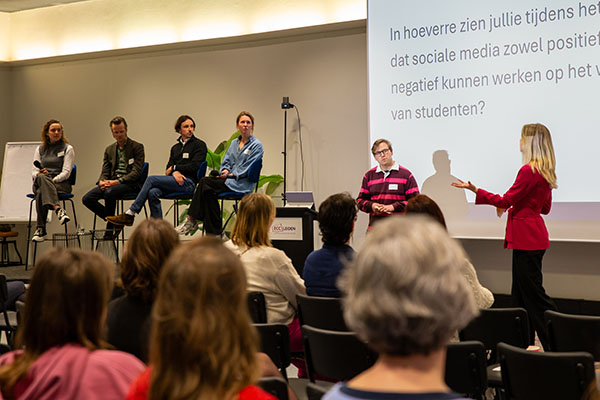
Panel discussion at Staff symposium on student well-being 2025 -
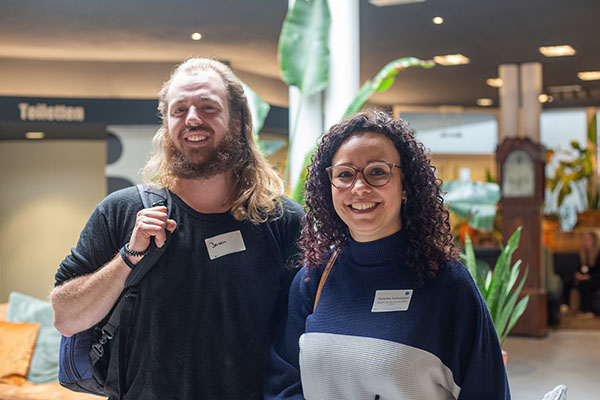
Participants at staff symposium on student well-being 2025 -
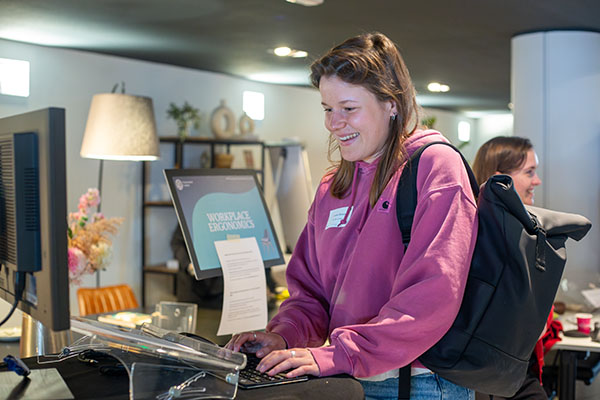
Student at staff symposium on student well-being 2025 -
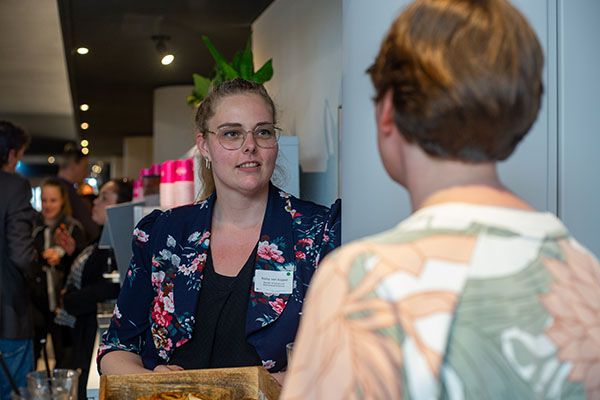
Discussion at staff symposium on student well-being 2025
Battle for our attention
‘The positive thing about it is that we also share experiences, tips and tricks’, said Jongejan about social media.
‘There is a battle for our attention. How can we recapture it?’ Slaman added.
The panel concluded that we have to keep on talking, which means asking questions, developing a sense of purpose and looking where our strengths lie. A good end to a good symposium.
The attendees still had much to say during the drinks afterwards. The coloured stickers on their name badges corresponded with their generation and made for lively conversations.
What did attendees think?
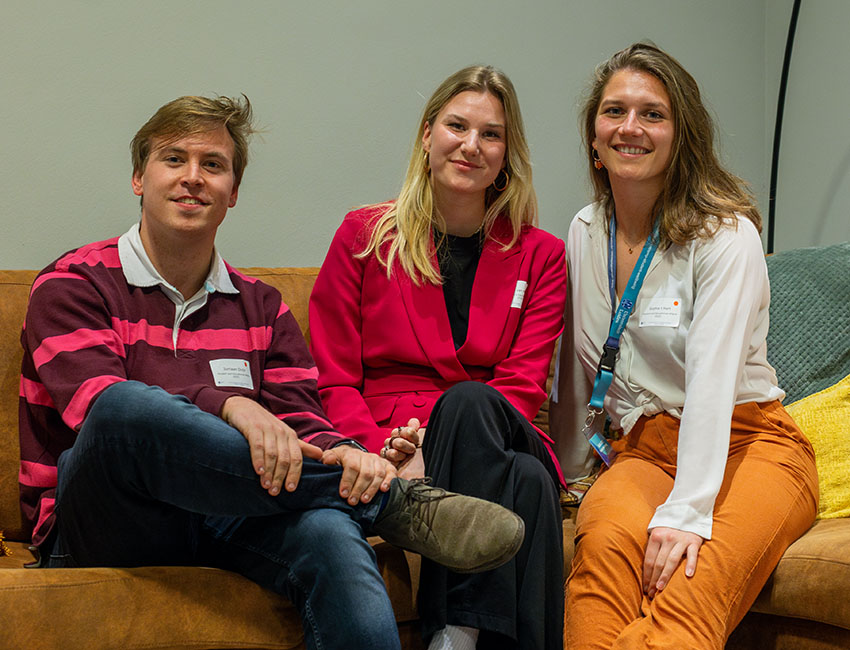
Jurriaan Duijn, Lucia van Kempen en Sophie ’t Hart, student well-being assistants and organisers/presenters
Jurriaan: ‘The audience’s responses showed there is more understanding than I expected. People are asking: “What are your experiences? What was student life like for you?” Showing your true colours with the stickers also worked well.’
Lucia: ‘The topic of Today’s Students is really relevant. The keynote was great. I liked how she confirmed that my generation of students are not all lazy. The circumstances for students really have changed.’
Sophie: ‘The attendees are really curious and keen to discuss the topics. It has really got people thinking, which is great to see.’

Nienke Jongejan, student psychologist and panel member (orange sticker)
‘I think it’s really inspiring. The keynote was great. I then did the Neurodivergence in Students and Creative Expression: Reflection and Resilience through Art workshops. Lots of topics came up. It was really dynamic. As a peer psychologist, I often see subjects such as trying to excel in everything in my practice. I think it’s valuable to have colleagues who are older and have a different perspective at times. That ties in with the message of this morning’s keynote.’
Yvonne Snelder, Health, Safety and Environment Coordinator for the University Services Department (blue sticker)
‘I can feel a lot of positive energy. People are connecting here at the well-being fair based on “What can I learn from you?” The broad programme attracts people from all sorts of groups. I’ve been able to help a few people here and will offer them more help or refer them on after today. Because good staff well-being means better care for our students.’
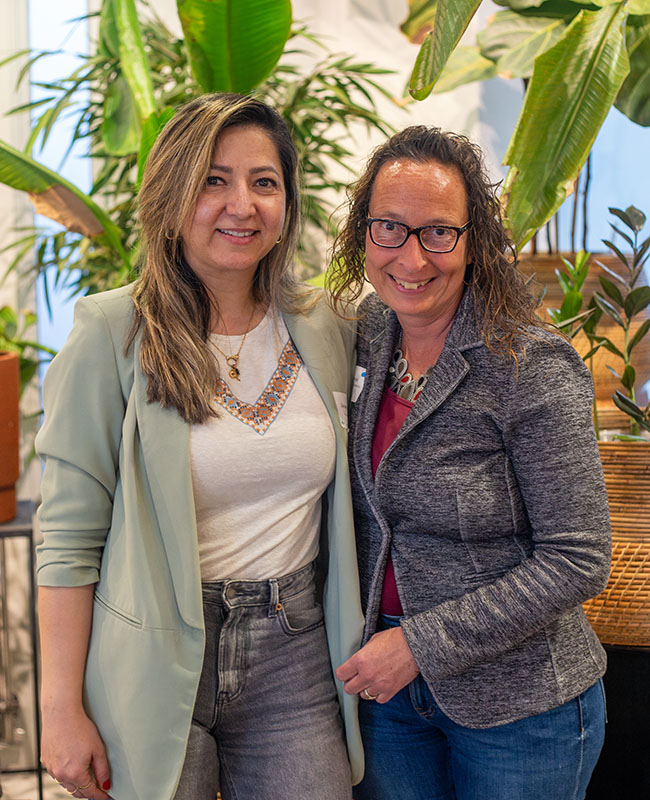
Zarlasht Khorsand, Education Coordinator for the Bachelor’s in Life, Science and Technology (green sticker), and Mireille Morroy, team leader for the Student and Education Affairs Front Office (blue sticker)
Zarlasht: ‘What do students come up against and how can I understand them better? That’s what I wanted to find out about today. And I suddenly thought: a speaker talking about resilience, like the one today, that’s someone I could invite to talk to our students.’
Mireille: ‘What struck me today was that there are already lots of initiatives running in parallel. I wasn’t aware of that. And we’re also working on the topic of generational differences within SEA. I thought it was interesting in the keynote that, in contrast to the media, the speaker emphasised connections rather than differences. That really resonated. Great that we have symposium – definitely one to continue!’
